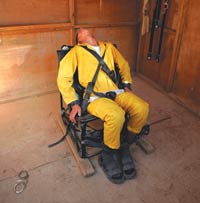
 Innovative Minds © 2014. All Rights Reserved. www.inminds.co.uk | ||||
|
[Other] Crueller than fiction7DAYS News, Dubai, Abu Dhabi UAE  TV Show 24 Jack Bauer, CIA agent extraordinaire, faces a terrified man tied to a chair in front of him. Through a window over Bauer’s shoulder, the man sees his two children bound and gagged. Tell me where the bomb is, Bauer orders, or we’ll kill your family. Silence. The prisoner watches as a thug kicks down the chair his son is tied to and fires a gun at point-blank range. He screams but still doesn’t relent - until the gun is pointed at his second son. Having got what he needed, Bauer whispers that the execution was staged. The scene from the television show ‘24’ is haunting, but hardly unusual on TV nowadays. The advocacy group Human Rights First says there has been a startling increase in the number of torture scenes depicted on prime-time television in the post-2001 world. Even more chilling, there are indications that real-life American interrogators in Iraq are taking cues from what they see on television, said Jill Savitt, the group’s director of public programs.
interrogators [at Abu Ghraib prison] asked an Iraqi translator to pretend he was being tortured to strike fear into a prisoner, after they had just watched a similar scene on a DVD
Human Rights First recently brought a West Point commander and retired military interrogators to Hollywood for meetings with producers of ‘24’ and ‘Lost’ to talk about their concerns about life imitating art. One man in the meeting was Tony Lagouranis, a former US Army specialist who questioned prisoners in Baghdad’s infamous Abu Ghraib prison and several other facilities around Iraq. He said he saw instances of mock executions like that in ‘24’. Once, some fellow interrogators asked an Iraqi translator to pretend he was being tortured to strike fear into a prisoner, after they had just watched a similar scene on a DVD. Television is hardly the only factor at play; Lagouranis said many American interrogators are young, receive little training and are pressured by commanders to extract information from prisoners as quickly as they can. But it’s enough of a concern that one professor at a military academy told Savitt that Jack Bauer represented one of his biggest training challenges.  Abu Ghraib Retired US Army Col Stu Herrington, who learned interrogation techniques in Vietnam and is an expert asked by the Army to consult on conditions at Guantanamo Bay, said that if Bauer worked for him, he’d be headed for a court-martial. “I am distressed by the fact that the good guys are depicted as successfully employing what I consider are illegal, immoral and stupid tactics, and they’re succeeding,” Herrington said. “When the good guys are doing something evil and win, that bothers me.” Prior to 2001, the few torture scenes on prime-time TV usually had the shows’ villains as the instigators, Savitt said. In both 1996 and 1997, there were no prime-time TV scenes containing torture, according to the Parents Television Council, which keeps a programming database. In 2003, there were 228 such scenes, the PTC said. The count was over 100 in both 2004 and 2005. They found examples on ‘Alias’, ‘The Wire’, ‘Law & Order’, ‘The Shield’ and even ‘Star Trek: Voyager’. In one ‘Lost’ scene, Sayid Jarrah was depicted holding a knife to the face of one adversary, suggesting that “perhaps losing an eye will loosen your tongue.” Howard Gordon, an executive producer of ‘24’, suggested that a helpless feeling in the nation because of terrorism and the Iraq war may be what creators are reflecting in their shows. There’s been a surge in general in the level of violence tolerated in prime time. “Perhaps at some level it’s an expression of our anger and our helplessness,” he said. On ‘24’, which a week ago depicted Bauer torturing his own brother by sticking a bag over his head and injecting him with a fictional drug that causes intense pain, producers say they try not to glamorize such scenes. Gordon said they try to show the acts take a toll on Bauer, too. Television has a limited time and a need to keep viewers from changing the channel. As much as he learned from the interrogators and respects their point of view, ‘24’s’ Gordon said their desires and his are going to naturally be at odds sometimes. “We’re not a documentary or a manual on interrogation,” he said. “We’re not a primer on the war on terror. We’re a television show.” Savitt said she understands. The goal is to educate people who are writing interrogation scenes without ever speaking to a real interrogator. She’s seeking Hollywood’s help in spreading that message, perhaps inviting Kiefer Sutherland to West Point to drive home the point that Jack Bauer is fiction. Human Rights First’s ultimate desire is to make clear the idea that torture by Americans should never be tolerated. “We would never try to censor anybody,” Savitt said. “We would never tell Hollywood what to do, but we are trying to tell them what legal interrogation looks like. If it makes them pause, that’s a bonus.” Source: http://www.7days.ae/en/2007/02/13/crueller-than-fiction.html Also Of InterestPage URL: http://www.inminds.co.uk/article.php?id=41
|
|
Support Us
If you agree with our work then please support us.Campaigns INMINDS Facebook Live Feed Latest Video's
INMINDS Twitter Feed Tweets by @InmindsComFeatured Video's
You need Flash player 8+ and JavaScript enabled to view this video.
[all videos (over 200)..] Featured MP3 Podcast  "Unfortunately the zionists have control of the media throughout the world, they have usurped our name, the star of David, everything, all our symbols, the name - the Jewish state they call it, everything they have taken, and we have very little power to be able to speak up. We have God - that's the greatest power.." Neturei Karta, Jews against Zionism Islamic Human Rights Commission 10th Anniv. Nov 2007 [16min / 7Mb] [all podcasts..] Newsletter Feedback |
 |
 |












































